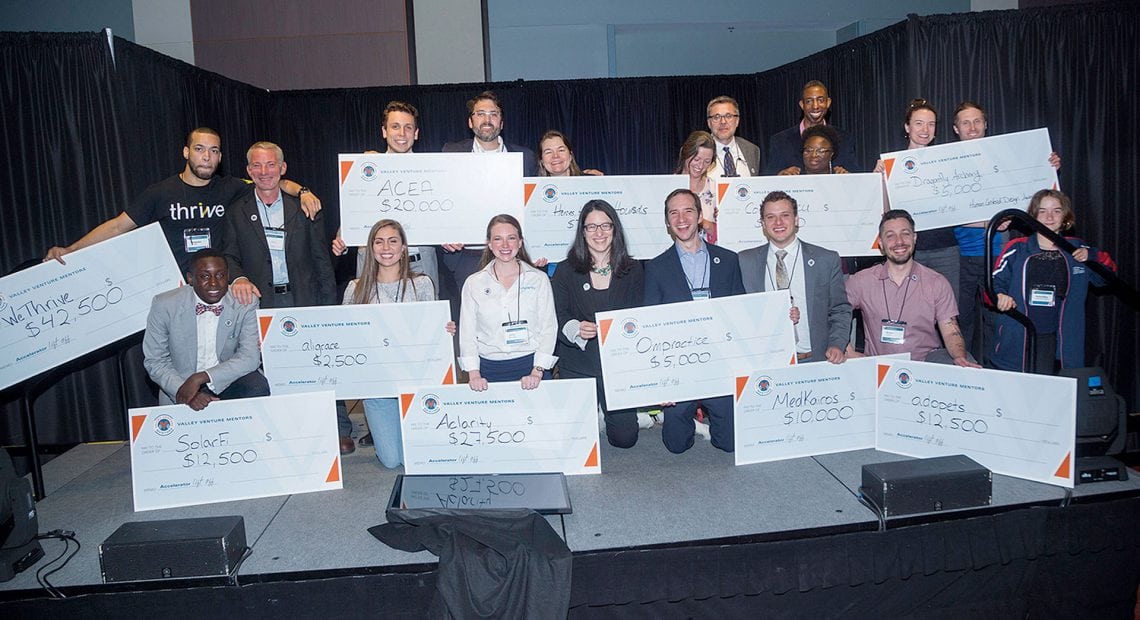
VVM Finalists Eager to Write the Next Chapters in Their Stories
Accelerating the Process
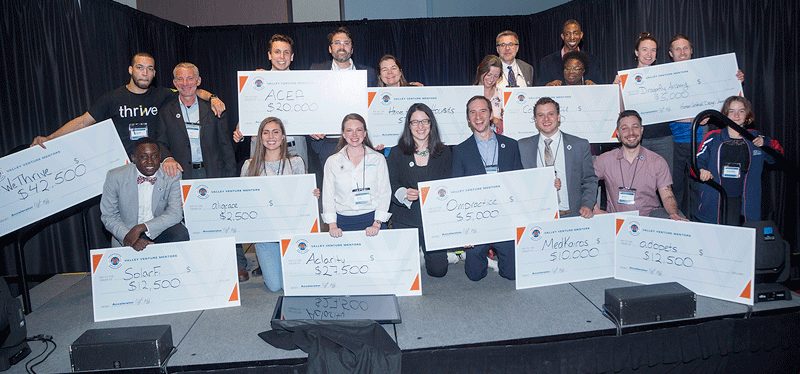
The winners of the 2018 Accelerator awards
The products and services vary widely — from smoothies to yoga classes; from pet adoption to solar-powered battery rechargers; from water-purification technology to entrepreneurial apprenticeships. But the companies in Valley Venture Mentors’ Accelerator class of 2018 have many things in common, specifically the myriad daunting challenges involved with getting a venture off the ground or to a higher altitude. For this issue and its focus on entrepreneurship, BusinessWest looks at the three highest finishers among the 12 Accelerator finalists. We talked to those entrepreneurs about everything from what they’re going to do with the large checks they’ve received through this competition to how the Accelerator program helped them advance their concept.
WeThrive
Venture Provides an Entrepreneurial Practice Field for Students
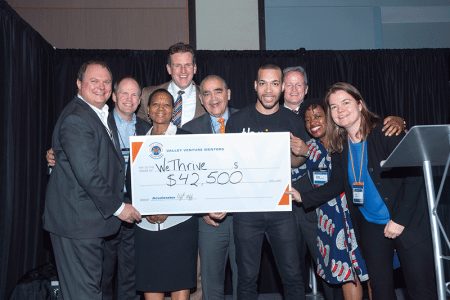
WeThrive was the top winner in this year’s VVM Accelerator Awards.
Daquan Oliver is still in his mid-20s, but he already has a lot of awards and accolades on his résumé, including many of those ‘under’ lists that have become so prevalent.
He was included on the Forbes 30 Under 30 compilation for 2017, as well as the Boston Globe’s 25 Under 25 list. Back in 2014, as he was graduating from Babson College with a bachelor’s degree in business administration, he was named one of the Top Five Black Student Leaders to Watch by the Clinton Foundation. He’s delivered a TEDx Talk on actionable strategies to overcome structural violence, and been recognized by former Secretary of State Hillary Clinton.
Yes, it’s an impressive list of achievements, and it looks like he’ll have to make room for more trophies, plaques, and citations — including the ceremonial first-prize check from this year’s VVM Accelerator program, featuring the name of the venture, WeThrive, and the number $42,500.
That’s because it’s Oliver’s goal — and WeThrive’s unofficial mission — to help young people make those same ‘under’ lists and other honor rolls.
Indeed, Oliver, who grew up in a single-parent, low-income household, made a promise at age 14 to assist future children in a similar socioeconomic position to become successful. In a nutshell, that’s what WeThrive, based in New York City, is all about.
This is a nonprofit 501(c)(3) that essentially equips and empowers — those are two different things — low-income students in grades 7-10 to rise as entrepreneurial economic leaders, Oliver told BusinessWest.
“The students we serve are bursting with ideas to break the cycle of poverty, but too many times in their young lives, they have been told ‘no,’” he explained, adding that WeThrive gives them encouraging ‘yes’ to their entrepreneurial dreams.
It does this by training teachers, staff, and volunteers to become entrepreneurial educators who guide students through a curriculum designed to reach those left behind in traditional classrooms. Each student creates their own company, earning real revenues and donating profits to the charity of their choice.
The result is what the company calls an ‘entrepreneurial playing field,’ one that provides lessons not just in profit and loss and other business terms, but also in realms ranging from goal setting to teamwork to surviving the ups and downs of transforming an idea into a business.
Oliver, who launched this enterprise as he was exiting Babson, has taken it to a number of major metropolitan areas, including New York, Boston, Oakland, Los Angeles, Chicago, and Washington, D.C., and it was while he was exploring the possibility of expanding into Greater Springfield that he learned about and then became part of the VVM Accelerator class of 2018.
His was, quite obviously, a story, a concept, a business plan, and a final pitch that won over the judges.
But as advanced and apparently rock-solid as this venture is, there is still growing and pivoting (that’s the term one hears a lot in rooms full of entrepreneurs) to do, and proverbial ‘next’ levels to reach, said Oliver, and the VVM Accelerator experience will help with all of that.
“We’re at a unique point in our journey,” he told BusinessWest. “We’re doing a number of different things, our model has recently pivoted pretty strongly, and we wanted to go through the nuts and bolts of really reassessing everything.”
The Accelerator program, a broad term used to refer to everything from the mentorship to the work sessions to the feedback from the other entrepreneurs in the room — helped with this by continually stressing the value of customer interviews.
“We need those to make sure we understand our principals, our teachers, the things they want, the value they see in WeThrive, their pain points, and more,” he explained. “That’s the biggest thing for us — the innate value of digging deeper into each of our customer pain points.”
Oliver said he was impressed by the strong sense of community within the VVM Accelerator and the manner in which the entrepreneurs, all vying for cash awards, nonetheless supported one another in their collective efforts to get to the next level.
“It’s technically a competition, but it never truly felt like one,” he explained. “Because we’re all rooting for each at the end of the day.
“When we approached this, we definitely wanted to win, of course,” he went on. “But we were much more focused on just creating a sustainable company, and VVM provided us with the resources to help do that, whether it was the mentors or the entrepreneurs.”
Oliver said WeThrive will begin operating in Springfield this fall, and he expects the nonprofit to expand into other parts of this region. Wherever it goes, it focuses on students who were like him — who all too often heard ‘no,’ and needed someone, some influence, to get get them to ‘yes.’
And in the process, maybe some of those students it helps will also follow Oliver onto some of those ‘under’ lists.
Breaking Through
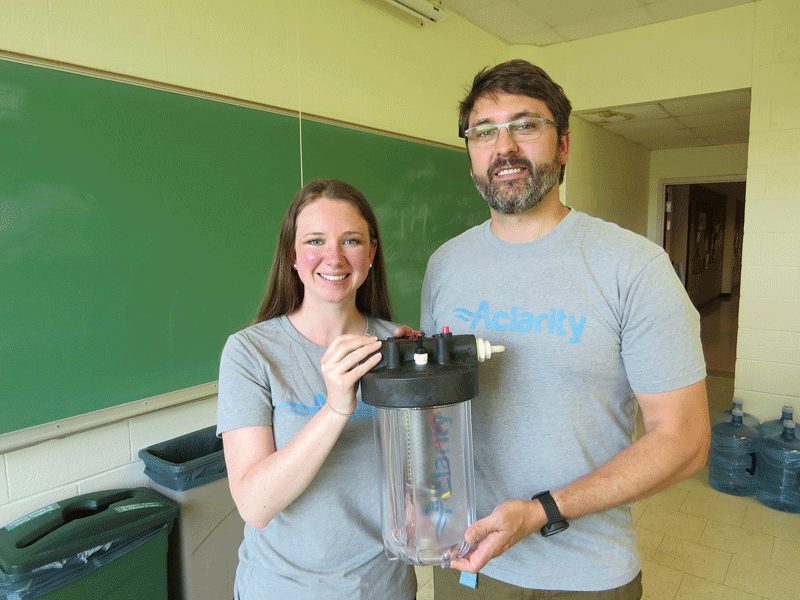
Julie Bliss Mullen and Barrett Mully say the market for their product may be vast, from residential and commercial applications to domestic sales to global interest.
Aclarity Set to Take New Water-filtration Technology to the Market
As Julie Bliss Mullen and Barrett Mully talked about the potential market for their product — a new type of water-purification device that uses electricity — they struggled somewhat to do the job with numbers, as many entrepreneurs do.
So they tried words, and one in particular: vast.
By that, they meant residential and commercial applications, domestic sales, and what they hope and expect will be truly global interest.
That’s because water is a precious commodity, and as the human population continues to skyrocket, the demands on the Earth’s limited supply of fresh water have increased accordingly. Meanwhile, the search for better, less expensive methods of filtering water have been intense and ongoing.
Bliss Mullen essentially grasped the size and scope of the potential market in 2015 when, while conducting evaluations of potential new filtration products as part of her lab work under the U.S. EPA’s Water Innovation Network of Sustainable Systems (WINSSS), she essentially discovered a novel, electrochemical advanced-oxidation process, or EAOP technology.
This technology has extensive treatment capabilities — more than the filtration products currently on the market — and low power-consumption needs compared to traditional processes.
“I found that the treatment capability of this specific technology was much greater than anything I had evaluated,” she told BusinessWest, adding that she became inspired to understand what it would take to bring the technology to the market, and in 2016 filed a provisional patent with the university and subsequently enrolled in entrepreneurship courses to further understand the commercialization process.
Moving the story along, Bliss Mullen and Mully met in the spring of 2017; she was participating as a student in a graduate-level Lean Launch Pad entrepreneurship class where she was conducting customer discovery while also seeking potential business partners. He was a fellow at the Berthiaume Center for Entrepreneurship and attending that class as a teaching assistant.
“My pitch to the class was, ‘hey, I have this cool technology, but I need someone with a little more business acumen than I have to bring this to the market,’” she recalled.
Mully became immediately compelled by the potential of the technology and the business that could be generated from it, and the two quickly agreed to partner up. They won the top award at the UMass Innovation Challenge, claiming $26,000 in seed money to help jump-start the company, which was initially named ElectroPure and later renamed Aclarity.
The company was accepted into the inaugural Berthiaume Summer Accelerator in 2017, and it used that experience to continue customer discovery, meet with mentors, work with the university toward converting the patent, develop a business strategy, and advance technology research and development. The company won additional seed funding and soon thereafter embarked on a collaboration effort with Watts Water Technologies Inc. to help bring a residential product to market, something they expect to do within the next 12 to 18 months.
So it’s been a whirlwind few years, and those are just the first few chapters in this intriguing story; the principals are now involved in writing the next several, and they will have their $27,500 prize from the VVM accelerator — and the many forms of assistance that were part of that experience — to help them in that process.
“It’s not all about the technology,” Bliss Mullen said of the complex process of taking a product to market. “You need to find a customer.”
VVM has helped with that, said the two partners, adding that the next step in their journey is to raise capital for a pilot installation on an industrial scale.
“We want to look at the scalability of the technology and how we can put a pilot site in, what that looks like,” said Mully. “And prove the technology on a larger scale; once we do that, that opens up other markets.”
The prize money from the VVM accelerator will certainly help in taking that next step, said the partners, adding that it (along with other grants secured in recent months) will be put toward R&D, product development, and marketing efforts. In a word, it will be used toward generating that commodity they need the most at this time: validation.
As for the startup ‘experience,’ if you will, the two partners, like just about everyone else in their shoes, talked about a roller-coaster ride, with lots of highs and lows. And also about expectations and how to manage them.
“We have a lot of people come up to us and say, ‘this is the next big thing. I want to be part of it; I want to help you fundraise,’” said Bliss Mullen. “You think, ‘this is going to change the world.’ And then you have other days when it feels like the end of the world.”
Mully agreed.
“You have a lot of ups and downs,” he told BusinessWest. “The wins are big wins — they’re really high highs. And then, sometimes, when you think you’re going to hit a certain milestone and it just doesn’t work out that way and you have to make those hard pivots … it can get really challenging.
“It’s not that there’s no end product, because there is,” he went on. “It’s just so intangible at times, it’s like you’re feeling your way through the dark a little bit.”
It appears things are a little brighter these days, and the VVM accelerator played a big role in that process.
ACEA
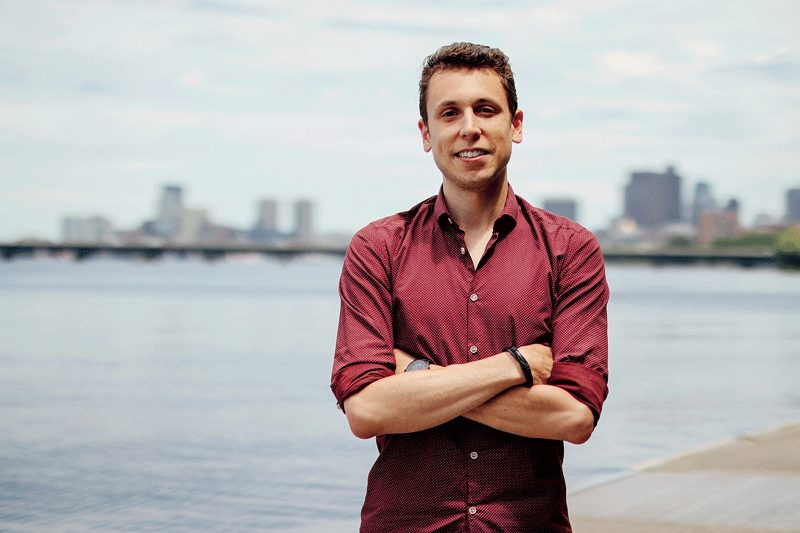
Kyle Kahveci
Venture Sets a New Standard for Continuing Education
Kyle Kahveci says continuing education is part of life for a wide range of healthcare professionals, from physicians to dentists to nurses. They need it to keep their licenses.
Unfortunately, also part of life are considerable amounts of wasted or underutilized time for those same healthcare professionals as they take part in those continuing-education experiences, said Kahveci, who is part of the founding team at ACEA.
That’s an acronym for the Advanced Continuing Education Assoc. And maybe the key word in the phrase is ‘advanced,’ which in this case is used to connote a way of thinking about this topic — a methodology, if you will, that goes well beyond what Kahveci called “checking the box” as individuals go about amassing the requisite number of hours of required education each year.
“There are now hundreds of thousands of different continuing-ed courses in healthcare, but there’s no easy way to sift through it all and really find the most relevant education and have that all centralized,” he explained. “What we’re doing is aggregating all that in one place so a clinician can have a much more pleasant experience across all of those ed providers by discovering the right education in the right place and the most relevant stuff for their requirements, but also their personal interests.”
That one place is an app that does everything from track activities as members attend activities to sending a notification to a member’s phone alerting him or her to the fact that they haven’t taken a continuing-ed course recently and need to do so.
The app is live, and a number of clinicians have joined through a host of partners that ACEA works with, including the Cleveland Clinic, Massachusetts General Hospital, Harvard Medical School, and the U.S. Department of Veterans Affairs, said Kahveci, adding that the broad goals are to continuously improve the app and add more members.
And VVM’s accelerator program has been quite helpful with those two assignments by emphasizing the need to for customer surveys to determine specific needs and how to go about meeting them.
Elaborating, Kahveci said that, in the beginning, ACEA and its app were focused mostly on helping healthcare professionals keep track of what they’ve done when it comes to a continuing education, something that might sound easy to those who haven’t tried, but definitely isn’t, as confirmed by all those who have.
“We were hearing complaints from physicians who said, ‘after one of these courses, I take I get a certificate, and it’s oftentimes on paper, and it’s like keeping receipts for taxes,’” he recalled, adding that the partners at ACEA followed how people kept track of these certificates. One physician kept it all in a manila folder that included courses from the ’90s.
Moving the story along, he said the first app they developed was designed simply to keep track of all those certificates much better than a manila folder could. It received a solid response, and thousands of clinicians signed on, he said, but it quickly became apparent that this app needed to do more.
Specifically, it needed to help members not just after the fact, but before it — in the discovery phase, if you will — and ACEA has made that shift, with a big assist from VVM and its accelerator program.
“VVM helped us treat this like an early-stage startup,” he told BusinessWest. “We did more 100 interviews with clinicians and partners to get a sense for where to really focus in on solving their problems.”
And there is tremendous growth potential, he went on, adding that, while ACE has tens of thousands of members, that represents a tiny fraction of the number of potential members.
The value proposition for this app is that it can save clinicians up to 40 hours a year by automating much of the continuing-ed process and getting them into relevant education. And considering how busy they are, 40 hours represents a great deal of value.
Getting that message across is critical, and the company will devote much of its energy — and the $20,000 prize it won during the accelerator contest — to do just that, while also continually improving the product and building a team.
The company is currently based in Boston — an ideal location, given the many world-class healthcare facilities in that city — but as a result of connections made with potential partners here, ACEA is thinking about opening a satellite location in Springfield.
VVM and its accelerator helped the company make those connections, he said, but mostly, the experience has enabled ACEA to sharpen its focus on the customer and identify opportunities for growth.
“It’s helped us see the forest for the trees,” he noted. “It was a good experience for us to help get the organization to the next level.”
George O’Brien can be reached at [email protected]





